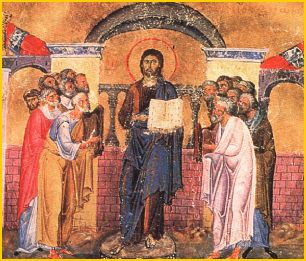|
|||
|---|---|---|---|
| This weekly bulletin insert complements the curriculum published by the Department of Christian Education of the Orthodox Church in America. This and many other Christian Education resources are available at http://dce.oca.org. | |||

Joshua, the son of Nun, is the man who succeeded Moses as Israel's leader and took the people into the Promised Land. The Book of Joshua describes his exploits as commander of the armies of Israel that marched into Canaan and followed God's instructions: "But in the cities...that the Lord your God gives you for an inheritance, you shall save alive nothing that breathes, but you shall utterly destroy them, the Amorites, the Canaanites and the Perizzites, the Hivites and the Jebusites...that they may not teach you their abominable practices which they have done in the service of their gods" (Deuteronomy 20: 16-18a). Some commentators see these verses as examples of the "bloodthirsty" Old Testament God who is so different from the merciful God of the New Testament that they can hardly be the same deity. Joshua, to these commentators, is a killer and no hero. But archaeological research has shown that the Canaanite civilization was deeply decadent. Child sacrifice, sexual perversion and gruesome cruelty to slaves and conquered enemies were common. We know that the Israelites were susceptible to the influence of their neighbors. For example, they wanted a king, as we read in I Samuel 8: 5, because all the other nations had kings. There was a real danger of Canaanite practices and attitudes infecting and eventually consuming Israel, a risk that Canaan might "teach you their abominable practices." 
The Canaanites had been given plenty of warning about what Israel could do. We know this from the words of Rahab, a harlot who lived in the big Canaanite city of Jericho and who had sheltered the two spies Joshua sent to "spy out" the land before Israel attacked. (The fall of Jericho is famously described in Joshua 6:20.) Rahab says, "For we have heard how the Lord dried up the water of the Red Sea before you when you came out of Egypt, and what you did to the two kings of the Amorites that were beyond the Jordan, to Sihon and Og, whom you utterly destroyed" (2: 10). She asks Joshua to let her family escape, and he honors his promise to do so. Hebrews 11:31 mentions Rahab as a woman of faith who "did not perish with those who were disobedient." Unlike the repentant Ninevites in the Book of Jonah, the disobedient Canaanites chose not to change their ways. Joshua saw his duty to God in total obedience. He seems to acknowledge, speaking shortly before he dies, that it is not always an easy choice to obey God. But his own decision is unequivocal: "And if you be unwilling to serve the Lord, choose this day whom you will serve, whether the gods your fathers served in the region beyond the River, or the gods of the Amorites in whose land you dwell; but as for me and my house, we will serve the Lord" (24: 15). |
|||
